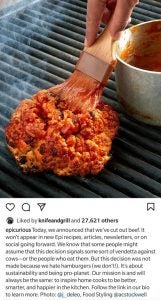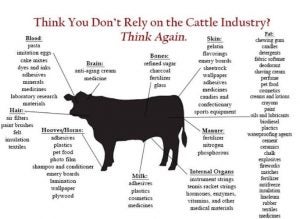The recipe website Epicurious has millions of followers on social media and receives upwards of 4.5 million organic visitors each month — making it one of the most well-known and popular food-related sites on the Internet. That also makes the company’s latest announcement nothing short of a bombshell revelation — and one that has drawn a sharp backlash from much of the agricultural sector: Epicurious says that they will no longer include new beef recipes on the site. Why? For environmental reasons, the site said in a blog post.
When you read the recipe site’s statements, articles, and sponsors on this, it’s quickly apparent that vegan food companies and animal-rights activists have succeeded in spreading their agenda and misinformation into the highest offices of Epicurious’ leadership. “For any person — or publication — wanting to envision a more sustainable way to cook, cutting out beef is a worthwhile first step,” Epicurious states in their new vegetarian manifesto.
Across its social media accounts on Monday, Epicurious explained that no new recipes, articles, newsletters, or social posts will feature beef — even though they try to make light of the situation by saying that the decision isn’t because they “hate hamburgers” but because they want to be “pro-planet.” The Instagram post had tens of thousands of likes in the first 24 hours.

However, when you take the time to read the comments section of social media posts, you realize how many people are outraged with this decision. The company’s move comes off as arrogant, privileged, and holier than thou. Worst of all, it also comes across as ignorant.
“As a foodie who is also a dairy and beef farmer I am deeply disappointed in this announcement,” farm and food blogger Dairy Carrie commented. “Beef’s sustainability story is fascinating and multilayered. Unfortunately there’s a lot of agendas that misrepresent and twist the data and facts on our sustainability to push their agenda.”
People should have a choice about what they eat (in recent years, meat has become an increasing part of American diets), and the public is exhausted with the continued cadence of virtue signaling and green washing.
In Epicurious’ blog post, they argue that “almost 15 percent of greenhouse gas emissions globally come from livestock (and everything involved in raising it); 61 percent of those emissions can be traced back to beef.”
The company, unfortunately, fails to highlight how the U.S. cattle market stands far apart from those worldwide numbers. Researchers have recently pointed out that efficiencies and livestock climate strategies implemented in the U.S. are far superior than what can be found elsewhere around the globe. American farmers and ranchers have looked at history, they know where the industry has been, and it’s clear that steps are continuously being made to become even better stewards of the land.
Case in point, the livestock industry is now 10 percent more efficient than the 1970s, and according to the U.S. Environmental Protection Agency, beef is only 3.3 percent of U.S. emissions (for comparison, electricity and heat production are 25 percent, industry is 21 percent, and transportation is 14 percent).
Research from agricultural industry leader Cargill has found that about 14.5 percent of global human-originated emissions can be attributed to agriculture (that’s all agriculture, from livestock as well as from large conventional tractor usage to heavy organic tilling and everything in between). Other Cargill findings backed up what the EPA has already found: that approximately 3 percent of U.S. emissions are attributed to methane emitted as a result of enteric fermentation — a natural part of the digestive process in ruminant animals.
Cattle are also key players in carbon sequestration. On her Buzzard’s Beat blog, rancher Brandi Buzzard Frobose delves the long-term capture and storage of carbon from the atmosphere. “When cows are grazing in pastures — like they do for most of their lives — they are restoring carbon to the soil while simultaneously reducing greenhouse gas emissions and turning grass into nutritious beef for families like mine across the United States,” she writes.
Reducing our impact on the planet is a noble cause, but at the same time, beef offers many benefits and is a nutritional powerhouse of a protein that feeds a ton of people. Here is just one example from farmer and hunger activist The Punk Rock Farmer:
I read every statement and article that Epicurious released and was astounded and the amount of nonsense they are spreading about the livestock industry. As The Punk Rock Farmer stated, this misguided approach is scary. Based on the known and accepted science about the continued sustainability and nutritional value of beef, it’s easy to become wary of Epicurious’ “experts.” This tweet offers a chuckle:
This seems relevant: pic.twitter.com/JWu5UhfH1E
— Michael Byrne (@michaelbyrne) April 27, 2021
In trying to be “pro-planet,” there are many other and better avenues that Epicurious could take — for example, they don’t mention that, according to the American Farmland Trust, we lose 3 acres of farmland every minute to urban development, or that a huge swath of beef grazing land is used for that agricultural purpose because it’s unsuitable for crops. Too often, people don’t think about the carbon footprint of their pets or daily coffee habit, but it’s there, and the compounded impact is staggering.
It’s important to note, too, that cattle are the ultimate recyclers. Epicurious may not realize that livestock are fed millions of tons of “ugly” foods and scraps like hulls and shells that would otherwise end up in landfills or go to waste. For example, in the Idaho potato industry, cattle are fed rejected potatoes. Cattle are also efficient grazers and part of the ecosystem, reducing risk of wildfires and regenerate our soils.
And, these animals are so much than food:

There’s never been a better time to step up and have these conversations. We have to be advocates for our industry and help people who don’t live and breathe the same things we do to learn and understand that farmers and ranchers put sustainability in mind every single day. Cattle are a part of the solution, not the problem.
Epicurious, let’s talk. Will you have a conversation and visit the great farmers, ranchers, and other experts who can show you research and the real facts of what we do?
Michelle Miller, the Farm Babe, is a farmer, public speaker and writer who has worked for years with row crops, beef cattle, and sheep. She believes education is key in bridging the gap between farmers and consumers.



